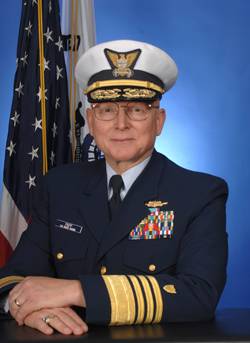Coast Guard Commandant Delivers Annual SoCG Address
Coast Guard Commandant Adm. Bob Papp delivers State of the Coast Guard Address.
U.S. Coast Guard Commandant Adm. Bob Papp delivered the 2013 State of the Coast Guard Address at the National Defense University at Fort Lesley J. McNair in Washington, D.C., Wednesday. The Commandant highlighted the Coast Guard’s response to Hurricane Sandy, emphasizing the preparedness of Coast Guard Captains of the Ports working with U.S. Department of Homeland Security components and industry in advance of the storm. He also discussed how the service used Rescue 21 and the Automated Identification System to locate vessels that might be in the path of the storm and to warn them. He also emphasized the Coast Guard’s prevention efforts and stated that “the best search and rescue case just might be the one we prevent.”
The Commandant said he is optimistic that the Coast Guard will be able to continue meeting its missions because the service’s greatest asset, its people, is what inspires the confidence of the Coast Guard.
The Commandant also mentioned the Commandant’s Situation Report (SITREP) 2013, which was released Wednesday. The SITREP details the accomplishments in pursuing the service’s priorities and objectives outlined in the Commandant’s Direction released in 2011, and the key work that remains to be done.
He stated that proficiency must remain the enduring anchor of the Coast Guard: Proficiency in craft, proficiency in leadership and disciplined initiative. Training, education, qualification and certification, along with advanced knowledge, experience and seasoning are among the elements to proficiency, the commandant said, and these are the service’s obligation to individual Coast Guardsmen. The additional elements of self-discipline, the drive to achieve higher levels of excellence and the continuous pursuit of mastery of craft are owned by us as individuals, he added.
“We will continue to provide these to our people. But I am concerned that shrinking budgets have impacted our ability to hold courses, pay for travel to training and provide the necessary extra boat and aircraft hours. We must continually seek smarter, more innovative and more economical ways to provide these experiences. Our people deserve it and our service to the public demands it,” the Commandant said.
The Commandant addressed issues he said have no part in the Coast Guard, including sexual assault. He said progress has been made in the Sexual Assault Prevention and Response Program, with the Sexual Assault Prevention Council directing implementation of task force recommendations and coordinating service-wide efforts to eliminate sexual assault in the Coast Guard, improving the response capability and the victim support network and putting an emphasis on education and training.
The Commandant said he rejects “the assertion of some experts that sexual assault is an unavoidable element of military service culture — not in my Coast Guard,” and ensured the service will work to “ensure accountability for those engaging in this violent crime or those who allow it to occur.”
Looking toward what is on the horizon for the Coast Guard, the Commandant discussed the emerging frontier of the Arctic, stating “as the receding ice increasingly gives way to commercial ventures and human and economic presence increases, so do our responsibilities.” He said the Coast Guard’s first comprehensive Arctic Strategy is planned to be released in March and will focus on improving Arctic awareness, modernizing governance and broadening partnerships.
The Commandant discussed how the Coast Guard’s missions ensure adherence to a system of rules and sustain the mechanisms designed to provide for the security, safety and prosperity of the United States and all those who use the maritime domain. In short, he said “what we are doing is providing maritime governance. I believe that one measure of a nation’s greatness can be measured by the resources it provides for mariners to safely and securely approach its shores…and it is critical to our national security.”










